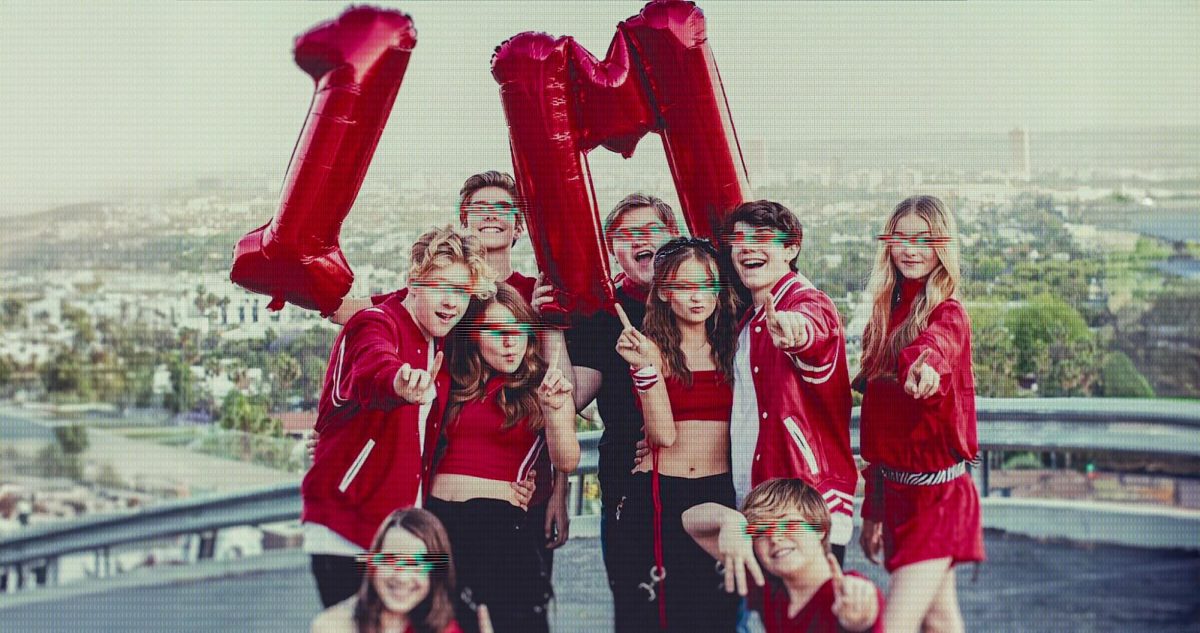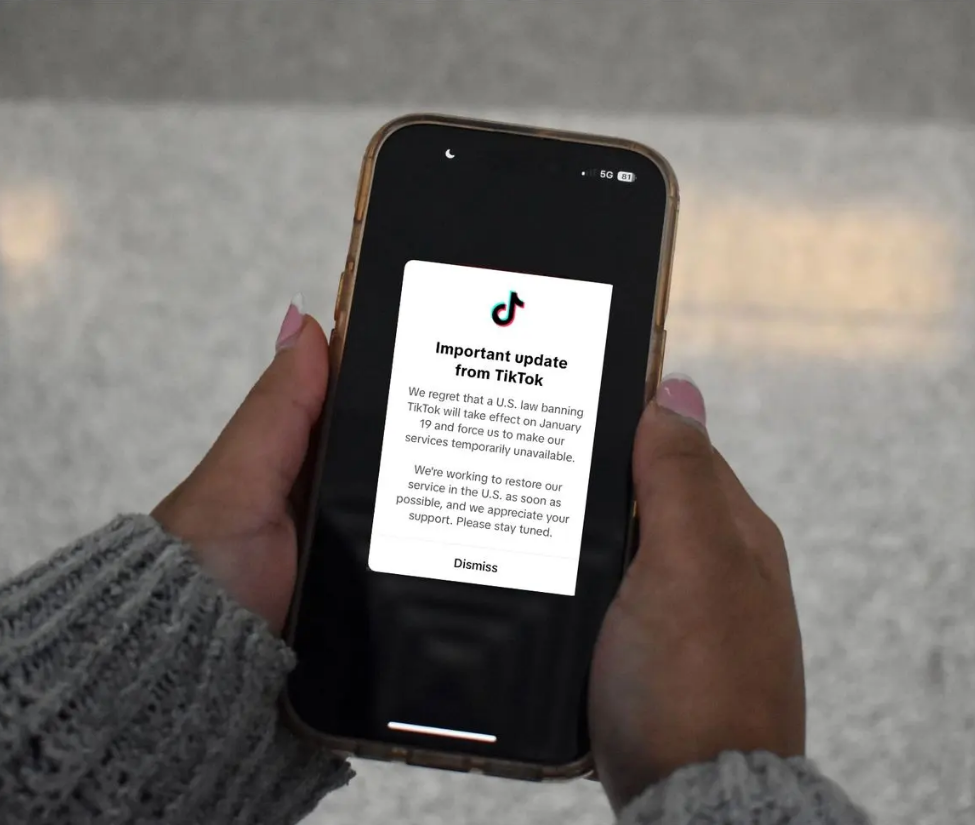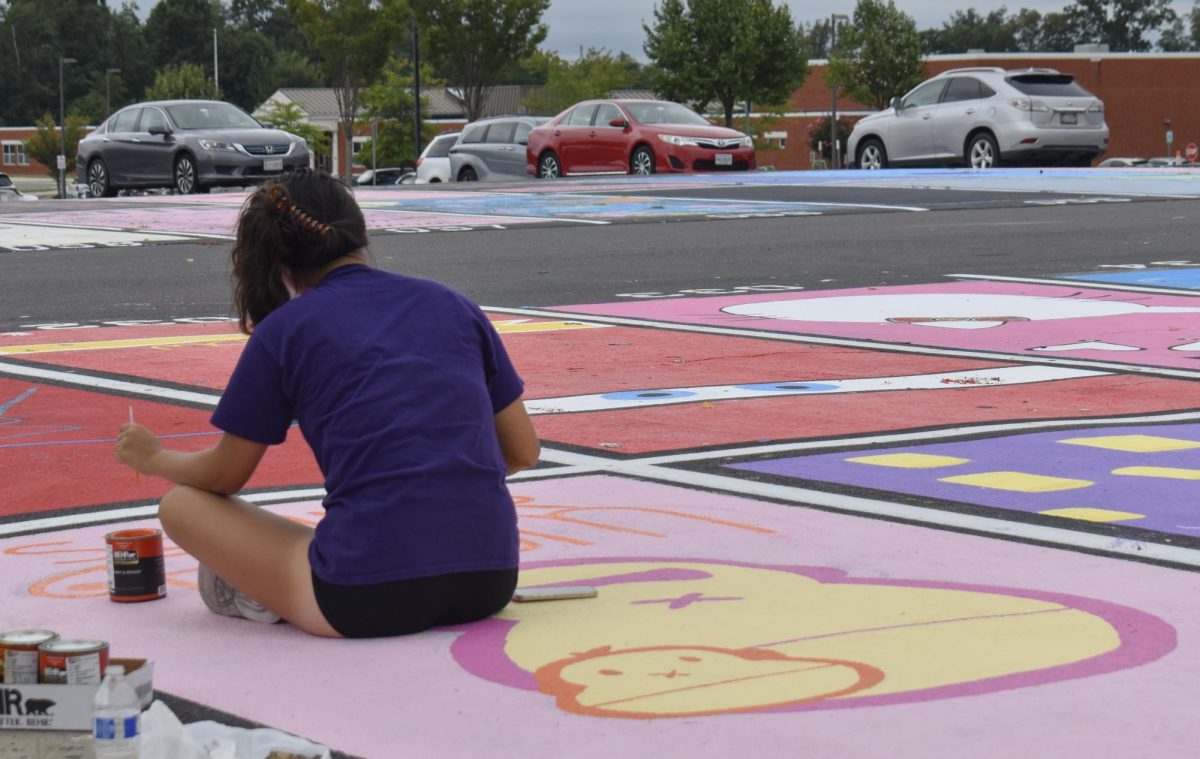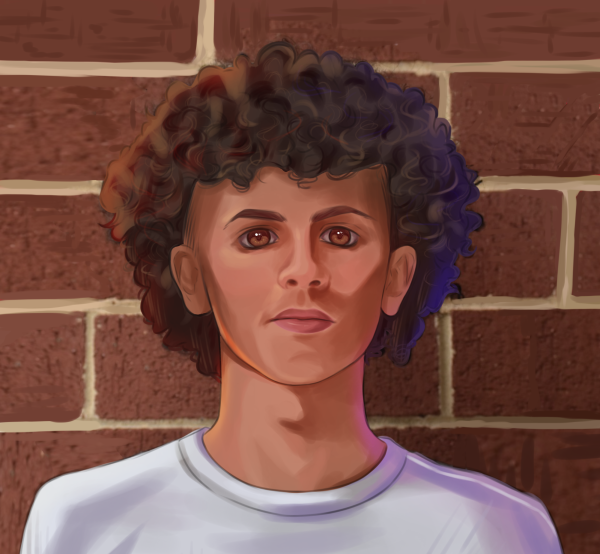On Saturday, Jan. 18th, like many high schoolers, junior Rushitha Simini was ready to conquer her schoolwork, the reality of the mounding pile of school assignments during midterms week hitting hard. After finishing a day’s worth of work, she slumped into bed and opened her phone. While some use their free time to nap or head outdoors, she uses hers for something else—watching TikTok and gaining a quick burst of dopamine.
She expected her usual routine, scrolling on the “For You” page, checking her inbox, and tagging friends in videos. Instead, the app greeted her with an ominous message stating that TikTok would not provide service anymore to U.S residents. There was no rush of dopamine—only a wave of immense concern.
She scrambled to save her old posts, but to her dismay, the app had stopped working completely, leaving her nothing but failed attempts to preserve memories. “Within a moment, I realized how fragile those little routines can be,” Simini said. “My daily routine of watching TikToks after school was suddenly gone.”
TikTok, a social media platform centered around fun dances, entertainment, and trends, has now become the center of international controversy. On Jan. 18th, at approximately 10:30 p.m., United States users opened their app and were greeted with a pop-up screen, detailing the app’s temporary ban.
Avid users of TikTok were left heartbroken as their favorite app was no longer available, and confusion and uncertainty circulated amongst users. Simini, who averaged nine hours daily on TikTok, struggled to cope with the ban. “I was pretty upset [because]everyone thought it would be gone on Jan. 19 at midnight, but then it was four hours earlier,” Simini said. “I think that caught everyone by surprise. I would instinctively open the app every five seconds, and then I’d just forget that it was banned.”
12 hours later, the app was back up, displaying another message, thanking President Donald Trump’s efforts to bring TikTok back: “A law banning TikTok has been enacted in the U.S. Unfortunately, that means you can’t use TikTok right now. We are fortunate that President Trump has indicated that he will work with us on a solution to reinstate TikTok once he takes office. Please stay tuned!”
The popular social media app has now taken a turn, as quick policy changes and executive orders have added a new layer of political schematics, making the future of TikTok in the United States unclear.
How Did We Get Here?
In 2020, national security concerns worried the U.S. government due to TikTok’s ownership by a Chinese company, ByteDance. At the end of his first term, Trump proposed a ban on the app due to perceived security threats. The government was anxious at the thought of the Chinese Communist Party having access to American’s personal and proprietary information, such as location, device identifiers, network information such as IP addresses, user’s direct messages, and search and browsing history.
Cybersecurity and business teacher Roxana Cromwell agrees that TikTok poses security concerns. “It’s probably not maliciously intended, but the fact that it’s owned by a nation-state that we have a love-hate relationship with causes some concern,” Cromwell said. “There’s a lot of information that is being gathered by the algorithm that TikTok uses for businesses and individuals. It’s not until we’re willing to face that concern dead on and make concessions or sacrifices, that we have hope of maintaining national security.”
Additionally, TikTok’s “For You” page raised concerns about the Chinese government influencing what Americans see, hear, and think by affecting Americans’ commercial, cultural, and political behavior. There was a fear that U.S. users would be manipulated by Chinese propaganda through the app, and U.S data such as public videos, bios, and comments were all supposedly accessible from ByteDance’s Beijing offices.
The threats were escalated following a lawsuit by Yintao Yu, a previous employee of ByteDance, who claimed that in 2018, the CCP spied on pro-democracy protests in Hong Kong by using TikTok to identify and monitor the activists’ locations and communications.
China’s laws allow the Chinese government to secretly demand data from Chinese companies and citizens for intelligence-gathering operations, making TikTok appear to be even more dangerous.
Prior to the House passing the bill, numerous hearings were held to investigate the potential national security threats posed by TikTok. The law heard testimony from former employees and experts, who brought to attention concerns about data privacy and the potential for foreign influence. These hearings then played an essential role in building support for the ban.
Trump’s initial efforts to ban TikTok weren’t executed until April 2024, when Congress passed the TikTok ban-or-sell act, signed by President Biden, forcing ByteDance to sell TikTok to a U.S company or face a U.S ban. On May 7, 2024, TikTok sued the U.S. federal government, arguing that a ban violated the First Amendment right to free speech. On Jan. 17, 2025, the Supreme Court unanimously upheld the ban, holding it true as constitutional as national security threats overshadowed any other concerns.
“At the end of the day, it’s about security and that supersedes freedom of speech and personal business interests,” Cromwell said. “If the powers decide that a ban on TikTok is necessary for national security, then that’s what the powers will do. You don’t want to be the company or the individual that says, ‘No, I want TikTok because it’s giving me my livelihood at the risk of national security.’”
On Jan. 18, TikTok went dark and was removed from all app stores. Today, if users don’t already have the app, they will be unable to download it. On Jan. 19, a message was displayed: “Thanks for your patience and support. As a result of President Trump’s efforts, TikTok is back in the U.S!”
Trump switched his stance on TikTok and fought to unban it, becoming perceived as the “savior” of the app. On Jan. 20, Trump signed an executive order, extending the ban 75 days to find a U.S buyer.
Rock Ridge Reactions
As many users were preparing for the ban, misinformation regarding the app’s future began to surface. For many students, TikTok was their primary source of entertainment and memories. “I was literally uploading and saving my old TikTok drafts because I honestly thought that my whole account would be deleted,” Simini said. “I was really sad because half of my childhood was on TikTok. I was on the app when I was 12, and now I’m almost an adult.”
Sophomore Madison Kim shared that sentiment. “ I was just in disbelief because there were so many moments in history when they said that it was going be banned, but it never did,” Kim said. “I didn’t really think much about it until I couldn’t open [TikTok], and it was just a total shock for me.”
Junior Khem Temoka, who gets paid for making content on TikTok, also strongly opposed the ban. “I think if the app got banned [entirely], my source of income would stop, and it would definitely affect me emotionally, mentally, and physically because it’s a big deal,” Temoka said. “It really changed my life. I use the money to buy groceries and pay off debt.”
To other students who spend much less time on TikTok, a ban felt like the right move. “TikTok is something out of U.S control, so we don’t know what China is potentially doing with it,” senior Rishabh Goel said. “Obviously, TikTok’s algorithm is great and all, but it’s nothing special compared to other platforms, so there’s always going to be a U.S alternative we can just use. I don’t see the harm in banning TikTok for protecting users’ interests.”
As TikTok users prepared for the app’s removal, many sought out other apps such as RedNote, Triller, and Bluesky. With RedNote, another Chinese-owned app, sharing many similarities to TikTok, many users were inspired to join. As the app got more of an American audience, fun memes and jokes were created such as “TikTok Refugee,” and it created a new sense of community where new and old users were able to connect with each other.
Political Ploys
Trump’s involvement in the unbanning of TikTok has raised questions on the motivation of his actions and what it means for TikTok’s future. The pop-up messages on TikTok directed at President Trump have added an underlying theme of politics that many are skeptical about.
Social studies teacher Tori Webb feels that the presidential election has political ties to TikTok’s situation. “I think that [Trump’s involvement] was mainly used as a stunt to make him be considered a ‘hero’ for bringing it back,” Webb said. “It’s very interesting how this just all happened within his inauguration, within those 24 to 48 hours. I think from Trump’s point of view, he saw how he was able to get his points across during the election and his message to younger generations and that was through TikTok and other social media apps.”
Simini concurs with this view, expressing her concern with Trump’s sudden switch up. “Trump was all about banning it, and suddenly he has a whole following,” Simini said. “He finds out that it’s actually beneficial to him, and now he’s bringing it back. I don’t really think he’s a ‘savior’ when he’s the one that introduced the whole ban in the first place.”
Cromwell has a little more trust in the government. “Well, he’s now our president, and he is the chief of the United States and foreign affairs, and he has several qualified people working with him, making justified decisions,” Cromwell said. “I’m sure he won’t make them lightly. And we in the United States get a lot of things from China in terms of our economy. So, to ruffle the feathers off of TikTok, solely, I think, is probably a complicated decision.”
However, with all the rumors, misinformation, and political connections surrounding the TikTok ban, Webb believes that users should be careful when considering the information they’re given about this situation. “I think just like any informed citizen, and especially someone who teaches history, I think we need to look at things from multiple different perspectives and dig a little bit deeper into the reasoning as to why, and not just the surface level,” Webb said.
The debate over the TikTok ban in the U.S. has left so many people wondering what could happen next. For many people, TikTok was their job, and for most people, TikTok was their form of true entertainment. If TikTok gets banned for good following the 75-day extension, this could cause a gap in the ways people connect with one another. While RedNote and other social media apps will be created, many users will still miss the unique culture that TikTok offers.
“If TikTok is turned off completely, then it’s going to have consequences, and it’s going to have consequences that we’re gonna have to live with for quite some time,” Cromwell said.




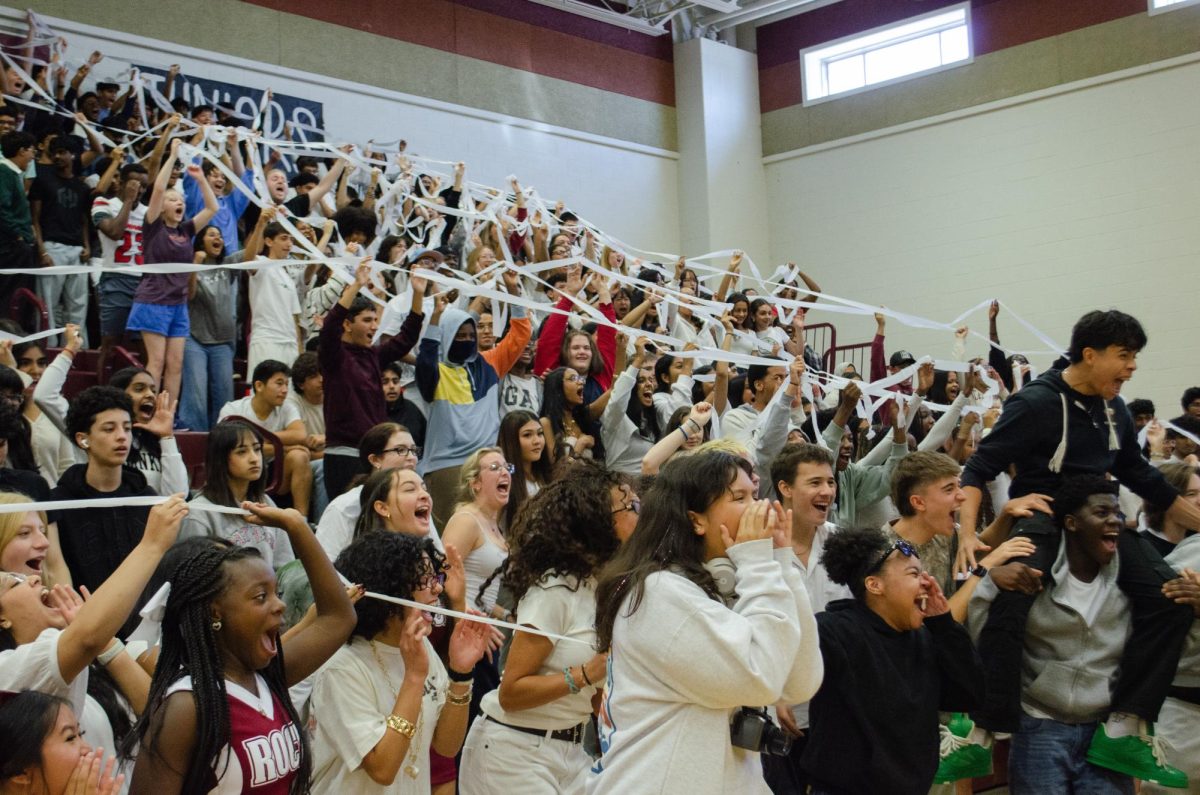














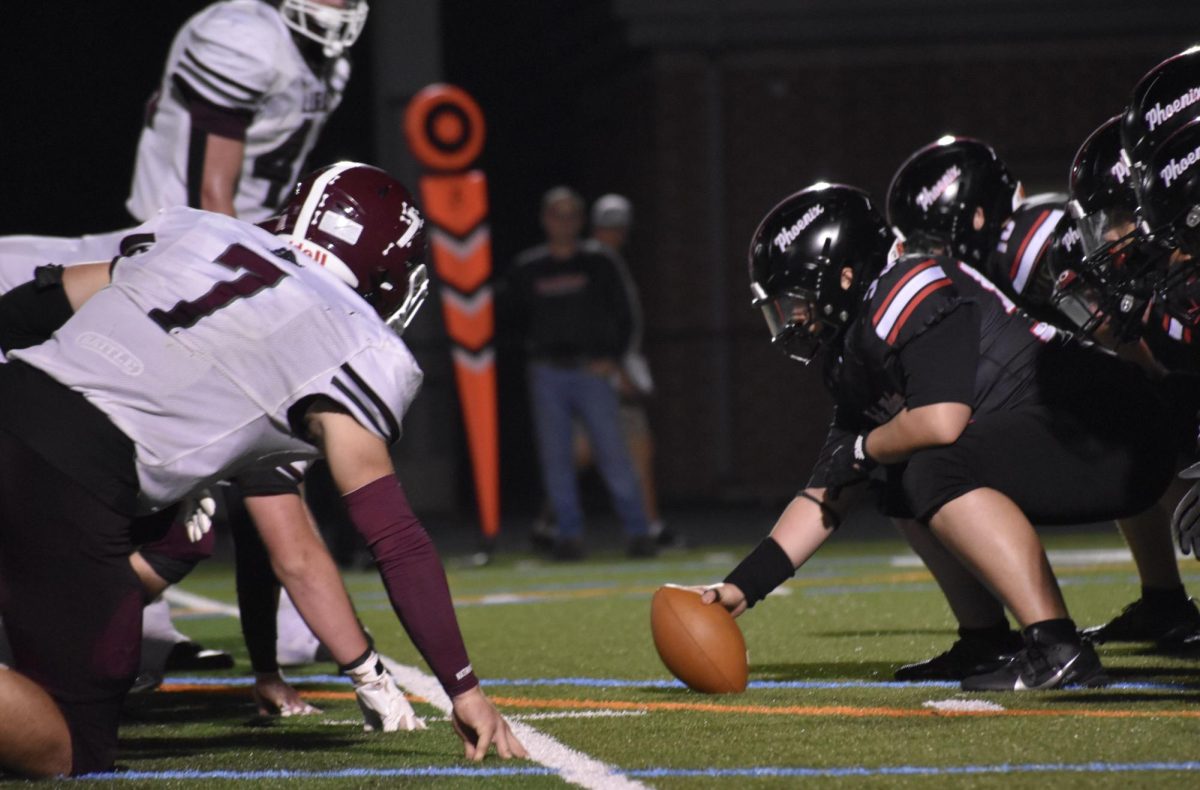





![The Phoenix varsity volleyball team lines up for the national anthem. “We were more communicative [with each other] during this game, and I feel like we kept our energy up, especially after the first set,” senior Jessica Valdov said.](https://theblazerrhs.com/wp-content/uploads/2024/10/DSC_0202-1200x800.jpg)










![Junior Alex Alkhal pitches the ball. “[I] just let it go and keep practicing so we can focus on our goal for the next game to get better as a team,” Alkhal said.](https://theblazerrhs.com/wp-content/uploads/2025/05/DSC_0013-1-1200x929.jpg)






